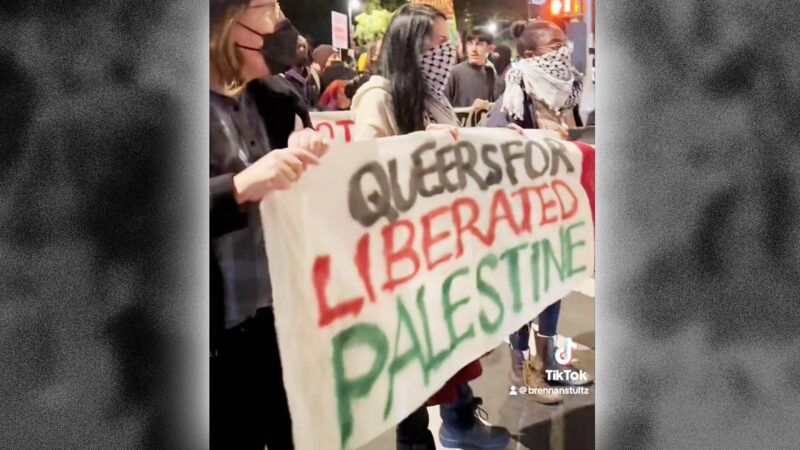The Contradictions of 'Queers for Palestine'
Gay and transgender people—both in the Gaza Strip and the West Bank—face an extraordinary level of persecution.

The Israel-Hamas war has made political allies out of some unusual bedfellows. Yet the strangest pairing on display thus far is probably "Queers for Palestine," most notably because those protesters would risk summary execution should they take their demonstration to the Gaza Strip.
The movement isn't new. But following the terrorist attacks launched against Israel by Hamas, the Palestinian group that controls Gaza, it has seen a sort of reemergence at various protests. "Queer rights! Trans rights!" protesters are heard chanting in a video taken in New York City. "We say no to genocide!"
That protesters appear to be blaming Israel for those attacks—which have included, among other things, Hamas militants murdering people, filming those acts, and putting the videos on social media for the victims' families and friends to see—is perverse. But to marry that cause to LGBT rights is simply unhinged from reality.
Indeed, gay and transgender people—both in Gaza and the West Bank—face an extraordinary level of persecution, persecution that may result in a yearslong prison sentence or even death.
In 2016, Hamas militants executed one of their own commanders, Mahmoud Ishtiwi, for allegedly having sex with another man. Ishtiwi's allegiance to the group was clear: Just two years prior, he had overseen 1,000 soldiers and an assortment of attack tunnels. But not even his loyalty could save him after they lodged accusations he had engaged in homosexual activity. Prior to executing him with three bullets to the chest, Hamas reportedly tortured him by whipping him, hanging him from a ceiling for hours, and cranking loud music into his cell in order to deprive him of sleep.
Last year, in the West Bank, 25-year-old Ahmed Abu Marhia's severed head was found on the side of the road after he was murdered for being gay. The killer videoed the execution and shared it on social media.
When it comes to "Queers for Palestine," what's richly ironic is that many LGBT Palestinians seek asylum in Israel—the same country these stateside protesters are rallying against.
At the heart of this contradiction is the tendency within social justice movements to pick a clear protagonist and antagonist, the oppressed and the oppressor, and to proceed from there in one-size-fits-all fashion. Some progressives decided long ago that Palestine is the former and Israel is the latter, which is the seed from which everything must grow. Palestine, then, stands not only for anti-colonialism but also LGBT rights and reproductive rights, despite that those rights, in any meaningful sense of the word, do not actually exist there.
Meanwhile, this orthodoxy requires that Israel symbolize a weed and everything that comes with it. The country, then, must typify genocide, regardless of the fact that it has been the victim of relentless terror attacks this month. And it has to represent a hostility toward minorities, including gay and transgender people, notwithstanding that it is one of the most tolerant societies for those very people.
To be sure, Israel's government isn't perfect. There are aspects of the Israel-Palestine debate, and the territorial disputes, that are more complex than many would probably like to admit. This aspect? Not so much, because "Queers for Palestine" is about as convincing as "minks for fur coats."


Show Comments (306)